
10 minute read
ALTITUDE MATTERS
At the recently concluded MEBAA Show 2022 in Dubai, class-leading business jets were on display, while mega deals were reached and concrete steps undertaken to enhance infrastructure and secure the future of this sector within the region
WORDS VARUN GODINHO
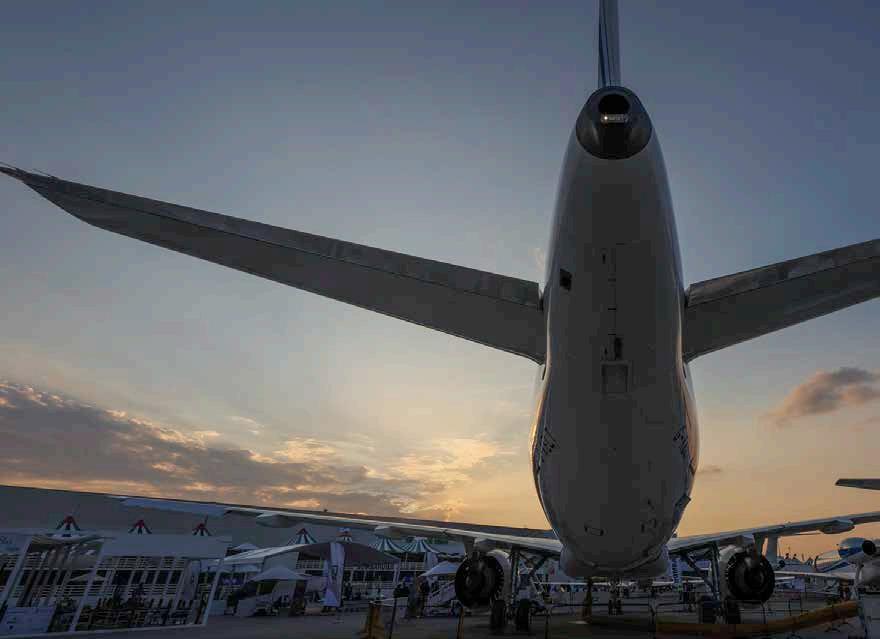

Blockchain, cryptocurreny and AI – the talking highlights at the MEBAA Show 2022, now in its ninth edition, were anything but conventional. The flagship event of the Middle East and North
Africa Business Aviation Association took place from December 6-8 at the Dubai Airshow site, with Sheikh
Ahmed bin Saeed Al Maktoum, president of the Dubai Civil
Aviation Authority, chairman of
Dubai Airports, chairman and chief executive of Emirates Airline and
Group, inaugurating the show.
It witnessed participation of representatives from over 95 countries.
Leading aviation manufacturers brought their top-of-the-range aircraft to the show. Bombardier exhibited its Global 7500, Gulfstream its G700 and G650ER, Embraer its Phenom 300E, Boeing its 737, Airbus its ACJ 320 Neo, and Cirrus Aircraft its very light Vision SF50.
Meanwhile Dassault also participated with its Falcon 8X. “In terms of programmes, we have two currently under development. The 6X is finalising its certification, and we should have its certification announced in the first quarter of 2023, after which it will enter into service in the second quarter. The second programme is the 10X. The 6X already has the biggest cross section of any business jet. Now with the 10X, it will be even bigger...you will feel like you are in an apartment. It will have a range of 7,500 nautical miles and a maximum speed of Mach .925 – long range and very high speed,” Carlos Brana, executive vice president, Civil Aircraft at Dassault Aviation told Business Traveller Middle East on the sidelines of the show. Dassault’s choice of exhibiting the
Falcon 8X was interesting, not least because the 6,450 nautical mile-ranged aircraft (nonstop from Dubai to New York or Jeddah to Sao Paulo) makes up around a third of the 75 Falcons operating within the region. Dassault says that its upcoming Falcon 6X already has “a significant number” of orders from the Middle East.
Dassault’s expansion and reach in the region will only be further solidified once its Execujet MRO Services unit opens its new 15,000 sqm maintenance, repair and overhaul facility at Dubai World Central early this year. The facility will reportedly be capable of servicing 18-24 aircraft simultaneously. It will be qualified to handle a full range of MRO activities, from line maintenance to major overhauls, and will serve Falcon operators as well as owners of other OEM brands. The new Execujet complex will replace the existing service centre at Dubai International Airport (DXB) as Execujet’s regional headquarters as well. Bombardier also announced last month that it will open a new service centre for business aircraft at the Abu Dhabi International airport (AUH) by 2025. The facility will have the capacity to fit up to four Global 7500 aircraft. It will be able to service the new Bombardier flagship, We have seen an the Global 8000, when industry transition it enters service in with significant levels 2025, and will provide of innovation maintenance solutions ALI AHMED ALNAQBI, founder and executive for customers of Bombardier’s Learjet, chairman of MEBAA Challenger and Global aircraft families. Beyond ultra-longrange aircraft, another concept of aircraft that will likely find a growing market within the region will be amphibian aircraft. Not only do all the GCC countries have extensive coast lines, giga tourism projects like the kinds which are being built along the Red Sea coast of Saudi Arabia will necessitate the use of amphibian aircraft. In fact, the upcoming Red Sea International airport will have a dedicated runway for seaplanes. At the MEBAA Show 2022, Dornier Seawings from Germany signed an agreement with UAE firm Gulf Enterprises to enable the entry of the former’s amphibian aircraft, Seastar, into the Middle East market. Certification flights are expected to be completed this year, followed by which it will likely enter into service next year.
One of the other major announcements to come out from the show was from Dubai-based private aviation specialist Empire Aviation Group, which reached an agreement with Mohammed bin Rashid Aerospace Hub (MBRAH) at Dubai South to develop a new, multi-purpose business aviation facility which will serve as the group’s global headquarters, on a plot adjacent to the VIP Terminal. The facility will be owned, managed and operated by Empire Aviation, which will in turn provide 100 per cent of the investment needed to build it. Construction is expected to begin early this year, with the facility set to be operational by the end of 2024. Empire Aviation is already deeply embedded in enabling the regional aviation ecosystem. It extended its current pilot training agreement with CAE until 2024. Empire Aviation’s pilots will train at the Emirates Flight Training Centre (EFTC) located in Dubai, and throughout CAE’s network too, on aircraft including the Bombardier Global 6000, Global 7500, Gulfstream G550, G650, Embraer Legacy 650 and the BBJ. In a further show of support for the industry, Empire Aviation said that its new planned facility in Dubai South will also have office spaces for other companies engaged within the aviation sector.
In more immediate plans, DC Aviation G-OPS confirmed at MEBAA that they will open a new FBO at Nice airport this month. With a lounge designed by Hollin + Radoske, the facility will be located at one of Europe’s busiest airports. DC Aviation says that the amount of
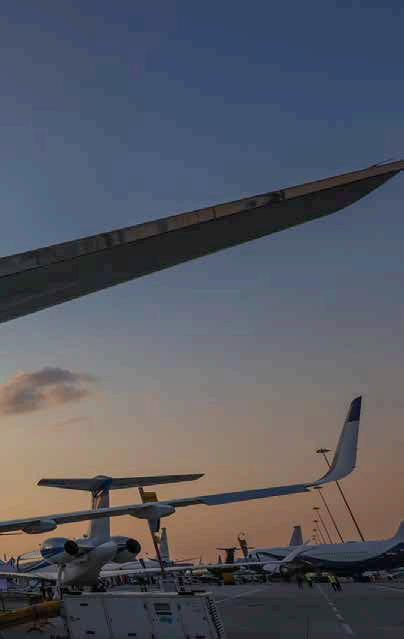
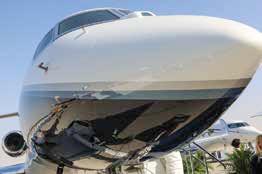
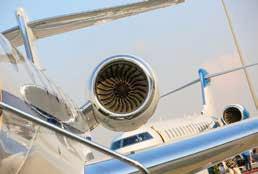
energy consumption and the materials used to build the FBO were chosen “to provide maximum efficiency while incorporating the use of green energy.” It added that plans are in place to deploy E-VTOL support as well as alternative energy resources for electric and hydrogen aircraft. Michael Kuhn, CEO of DC Aviation, said, “We are looking forward to building a dependable and close-knit cooperation with the airport and our local partners to achieve the set goals – in terms of sustainability as well – while offering our customers facilities that meet our high standards with respect to quality, comfort and discretion.”
With sustainability as a leading theme, the organisers at MEBAA decided to lead from the front. The organisers worked with Air bp as the carbon offsetting sponsor for the MEBAA Show. “As the carbon offsetting sponsor for MEBAA Show 2022, Air bp will offset any remaining calculated carbon emissions via bp’s carbon management business, bp target neutral,” said a spokesperson for Air bp. “Emissions will be offset by purchasing and retiring offset credits from bp target neutral’s offset portfolio. This offset credit purchase in turn will help compensate for the emissions associated with the event space and promotional materials.”
The BizAv Talks which were a brand new feature for the 2022 edition of the show delivered a number of key speakers who took to the stage to deliver fascinating insights on a number of subjects. On day two, Robert Plhak, CEO of VOO, and Gernot Winter, CEO of AVINOC shared a presentation titled ‘Stay ahead of the curve with cryptocurrencies’. “It’s not just about cryptocurrency. It’s about tokenisation as a whole, and the real goal is to connect the real world – the business aviation world – with the crypto world,” said Winter, sharing realworld examples of how tokenisation and blockchain can be used within the aviation industry for payments, loyalty programmes, aircraft ownership, security for airports, MRO solutions, identity management and ticketing.
By the time the show concluded, there was no dearth of enthusiasm as to the trajectory of business aviation within the region. “The
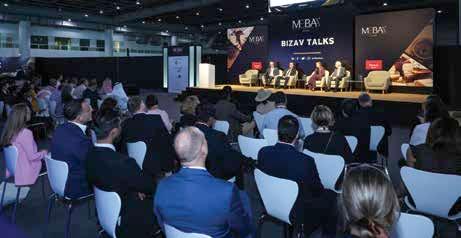
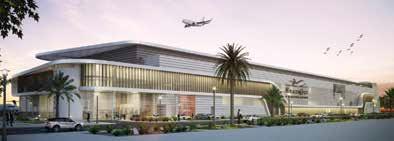

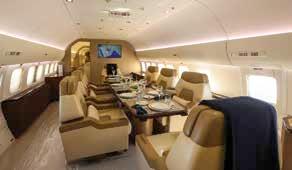
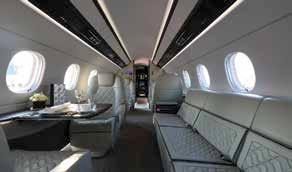
MEBAA SHOW 2022
The range of aircraft displayed at the show in Dubai included Bombardier’s Global 7500, Gulfstream’s G700 and G650ER, Embraer’s Phenom 300E, Boeing’s 737, Airbus’ ACJ 320 Neo, and Cirrus Aircraft’s Vision SF50, among others business aviation industry has grown significantly in the last couple of years, not only in the Middle East region where mega events such as Expo 2020 Dubai and the World Cup in Qatar have led to increased demand, but also in many key international markets. Throughout the three days, we have seen an industry transition with significant levels of innovation, technological advancement and digital transformations right across the show, along with many key deals and new announcements, all showing that this sector growth is set to continue well into the future,” said Ali Ahmed Alnaqbi, founder and executive chairman of MEBAA. With MEBAA stating the global private jet market is projected to reach nearly US$40 billion in 2025, up from an estimate of almost US$26 billion in 2021, that enthusiasm isn’t misplaced.
The human edge
How on-demand seasonal staffing models can address shortages of talent within the region’s hospitality industry

YOANN COULON MANAGING DIRECTOR OF THA STAFFING
According to JLL’s recent real estate market report, the UAE continues to witness a positive trajectory across its residential, office, retail and hospitality sectors in the third quarter of 2022. Most notably, the travel and tourism industry has seen a tremendous increase in visitors, with Dubai in particular welcoming over eight million international visitors in the first seven months of 2022 alone.
In a recent statement made by the Emirates News Agency, Dubai hotel establishments delivered a combined 18.47 million occupied room nights from January through to June this year, demonstrating a 30.4 per cent year-on-year growth. Consequently, several large international hotel groups and F&B operators expanded their operations within the country to respond to increasing demand, presenting a welcome opportunity for those searching for employment within the field.
As one of the most successful hospitality markets in the world, the demand for skilled labour reached new heights with the service industry hiring at an increasingly rapid rate. The pre-opening of the much-anticipated Atlantis The Royal, for instance, has created over 2,000 roles last year alone. Accordingly, staffing agencies have witnessed greater demand to secure top talent with flexible and practical employment solutions to support business needs and overall growth.
A recent study by Colliers identified that the GCC will require more than 90,000 skilled hospitality professionals by 2026. Significantly, the UAE and Saudi Arabia would account for 82,000 of that workforce. With soaring demand for human talent, hotel groups face enormous challenges in finding skilled employees, especially moving into the busy winter months each year. With high-profile sporting, cultural and business events planned across several locations in the Middle East over the coming months, hotels are expecting extremely high demand in the foreseeable future. Naturally, the demand for talent is consequently high and the support of staffing agencies becomes crucial in finding skilled employees during high seasons.
A dynamic region such as the GCC requires a unique staffing model for the hospitality sector, as demand fluctuates between peak travel seasons and the quieter summer months.
Due to this cyclical nature and the subsequent fluctuating occupancy rates, seasonal staffing solutions offer hotel operators the flexibility to minimise overhead costs by employing top-quality temporary staff, as and when required, and thereby not being forced to lay off staff when many residents and The GCC will tourists choose alternate destinations during the require over 90,000 summer months. skilled hospitality Post the high season professionals demand, staffing agencies are strategically able to redeploy by 2026 talent to different roles, driving operating costs down for hotels during off-season periods. As an added value, hotels and F&B groups are alleviated from the recruitment processes during the peak season as they are guaranteed top-quality talent on-demand; while simultaneously ensuring freelancers are also offered well-matched roles best suited to their knowledge and expertise. The challenge that hospitality institutions face today remains finding the right on-demand talent that can adapt to fast-paced working environments. The competitive advantage staffing agencies provide hotels offsets this challenge with the use of innovative databases and specially curated tools that incorporate a comprehensive screening process to match top-quality freelancers to specific client requirements and operational needs. Through this process, clients can hire the right temporary skilled candidates to supplement their permanent staff and thereby increase overall productivity and efficiency.










